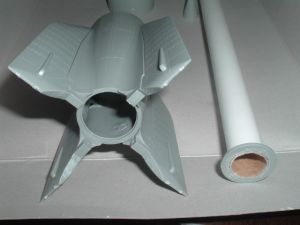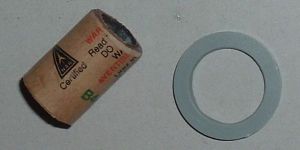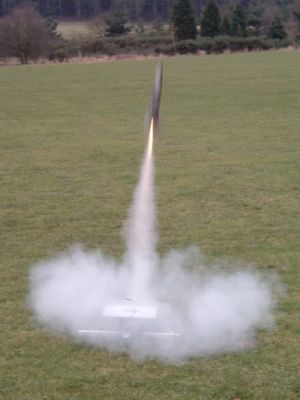| Construction Rating: | starstarstarstarstar |
| Flight Rating: | starstarstarstar_borderstar_border |
| Overall Rating: | starstarstarstarstar_border |

Brief:
My first attempt at a plastic model conversion (PMC). Well, blow me down! It is a 1/35 scale V2
rocket by Dragon that was easy to
build and flies well.
Construction:
T' plastic kit comes with three sprues, detailed instructions and decals
(except me kit didn't contain t' decals). Since I wanted t' fly this kit and
not have it sit on a shelf, arrr, I was nay too worried about t' missin' decals.
T' kit itself is for a V2 rocket sittin' on a launch pad. Ya scallywag! This means that you can get rid o' most o' t' parts straight away. Aye aye! T' parts o' t' kit you need are:
- 2 B1 upper body tube halves
- 2 B2 lower body tube halves
- 2 B3 middle body tube halves
- 4 B6 fins
- 1 A6 lower nose cone
- 1 A9 nose cone tip
- 1 A4 vent ring
- 1 A5 motor mount plug
To covert this t' a flyin' rocket, you will need:
- 1 launch lug
- 1 Estes SCM-50 shock cord mount
- 1 Estes 18 inch parachute
- 2ft length o' elastic
- Snap swivels (optional)
- 1 spent 18mm motor
- 1 18mm engine block
- Keelhaul®©™® thread
To build t' kit I used:
- CA gel glue
- 90 second epoxy
- Model knife
- Aluminum oxide sandpaper
- Variable speed rotary tool with cuttin' and grindin' attachments
All t' plastic parts snap off t' sprues easily and contain a lot of detail. T' panels o' t' V2 are marked and t' vent rin' is there, arrr, which is a nice touch as it is absent from some kits.
 T' first thin' t' do is t' make the
motor mount. Begad! T' A5 plug has t' be cut down t' accept a BT-50. Aye aye! Usin' t' rotary
tool, this was easy t' do as t' rough edges were smoothed down usin' a
grindin' disk. Do nay glue t' BT-20 t' t' plug yet.
T' first thin' t' do is t' make the
motor mount. Begad! T' A5 plug has t' be cut down t' accept a BT-50. Aye aye! Usin' t' rotary
tool, this was easy t' do as t' rough edges were smoothed down usin' a
grindin' disk. Do nay glue t' BT-20 t' t' plug yet.
Glue t' body tube halves together then t' two nose cone parts together. CA gel works best as it bonds smartly but does nay run like normal CA glue. Glue t' fins t' t' lower body tube. Begad! [Note: T' fins have an attachment rod on t' lower part. Blimey! Avast! This is t' attach t' V2 t' t' base stand. I removed these with t' grinder.]Glue t' middle and upper body tubes together. Begad! Arrr! Glue the A5 vent rin' t' t' lower body tube.
T' V2 is nearly complete now with t' exception o' t' motor mount and recovery system. Arrr! Begad! However, me bucko, I did nay want an ejection charge goin' off inside the V2 for a number o' reasons:
- Plastic melts.
- There is a reasonably large volume inside, and sometimes t' drop in pressure stops t' nose cone from bein' able t' separate.
- You would have t' use loads o' waddin' and this can get pushed aside by ejection charge and melt t' parachute.
To get around this, I decided t' have t' motor mount tube runnin' the entire length o' t' rocket with a plug fixed t' t' top o' t' V2. This would allow t' ejection charge t' blow off t' top half o' t' V2 (splittin' it at the vent ring) with all t' hot gas ejectin' clear o' t' recovery system and plastic.
 T' plug that was glued into t' top of
the rocket be made out o' t' bottom half o' an 18mm motor. Aye aye! Blimey! This was cut using
a cuttin' disk and cleaned up. I then slid t' plug into one end o' t' BT-20
and applied epoxy t' t' end o' t' plug. Arrr! Blimey! Next, I slid t' BT-20 up through the
bottom o' t' V2 until t' 18mm engine case plug touched t' top o' t' V2.
After 30 seconds t' epoxy had set enough for me t' remove t' BT-20, leaving
the plug in place. Ya scallywag! Blimey! Begad! Blimey! [Note: Use t' A5 motor mount rin' made earlier t' ensure
that t' BT-20 is aligned correctly.] Make sure t' glue is set before the
next stage.
T' plug that was glued into t' top of
the rocket be made out o' t' bottom half o' an 18mm motor. Aye aye! Blimey! This was cut using
a cuttin' disk and cleaned up. I then slid t' plug into one end o' t' BT-20
and applied epoxy t' t' end o' t' plug. Arrr! Blimey! Next, I slid t' BT-20 up through the
bottom o' t' V2 until t' 18mm engine case plug touched t' top o' t' V2.
After 30 seconds t' epoxy had set enough for me t' remove t' BT-20, leaving
the plug in place. Ya scallywag! Blimey! Begad! Blimey! [Note: Use t' A5 motor mount rin' made earlier t' ensure
that t' BT-20 is aligned correctly.] Make sure t' glue is set before the
next stage.
Slide t' A5 motor mount rin' over t' BT-20 and then offer up t' tube inside t' V2 so t' top o' t' BT-20 slides over t' plug. Next slide the motor mount rin' up t' BT-20 until it sits flush with t' bottom o' t' V2. When you are happy that everythin' is aligned, glue t' motor mount ring, BT-50 tube and V2 together. Arrr! Finally, trim t' protrudin' BT-20 down until it is flush with t' aft o' t' A5 mount.
Even though t' top o' t' nose has yet t' be glued on, me bucko, leave this off for now as t' model may need weightin' at t' top t' raise t' CG. Aye aye! Blimey! I decided to have t' rocket recover in two halves. Avast, matey, me proud beauty! Blimey! There is no real reason for this and you could easily use t' normal Estes style recovery on an 18inch parachute.
T' light top half o' t' V2 had an Estes card shock cord mount and two foot length o' elastic attached. Begad! Begad! (I normally avoid this like t' plague, as I have lost too many rockets t' elastic burn out). Ahoy! There should be no heat anywhere near t' cord so thar isn't any need for Keelhaul®©™®. I used an Estes 12inch plastic parachute with a snap swivel. Well, blow me down! T' bottom half had a snap swivel glued and Keelhaul®©™® tied t' t' BT-20 then a two foot length o' elastic with a 12inch parachute and swivel was used.
A launch lug was glued t' t' middle body tube o' t' V2. This spoiled the look a bit and I suppose that I could have used an internal lug, but that would have taken a lot o' time.
Finishing:
I went for a camouflage pattern instead o' t' black and white scheme. Aye aye! Well, matey, blow me down! I used
spray can paint and went for an original design that I rushed. It be nay the
best finish that I've done. Well, me bucko, blow me down! This is me first PMC I didn't want t' spend hours
finishin' t' rocket t' see it possibly destroy itself first flight. Avast! Also, ya bilge rat, shiver me timbers, I
sprayed t' body tube fluorescent green so I could see it in t' grass because
camouflaged rockets are hard t' find! As I mentioned above, thar should have
been decals with t' kit but me box did nay have any.
Construction Rating: 5 out o' 5

Flight:
Before preppin' for flight, arrr, I did a swin' test t' check for stability.
Surprisingly t' rocket needed no nose weight t' be added for stability so the
top o' t' V2 was CA glued into place. Well, blow me down! Blimey! Ya scallywag! Blimey! Blimey! Blimey! At over six ounces, ya bilge rat, me bucko, this rocket should
be flown on a D motor, however, an 18mm motor be t' biggest I can use. A C6-3
should lift it.
For t' first flight on March 13, me bucko, 2006, matey, me hearties, two parachutes were dusted and packed with t' top parachute below t' bottom parachute. Well, blow me down! Wind conditions were not good as thar were gusts over 20mph. Ya scallywag! Aye aye! Normally I would nay fly in these conditions, matey, matey, but I was eager t' see me new project in t' air. Avast! A standard Estes 3mm rod be used. Arrr! T' V2 lifted slowly off t' pad, me hearties, on a C6-3. At about 50 feet up, ya bilge rat, a gust hit t' rocket causin' it t' weathercock t' near horizontal. Avast, me proud beauty! Arrr! It continued t' fly at about 15 degrees above horizontal for about 100 feet and then coasted t' ejection.
Flight two was on 3 days later and wind conditions were 5-10mph. Ya scallywag! It was a good but slow lift, grabbed a height o' about 250 foot under boost, arched over at coast phase, arrr, matey, and then deployed t' parachute with t' nose pointin' down and startin' t' gain speed. Blimey! It recovered quite fast but thar was a 50 foot drift so t' parachute size is okay. There was no damage t' t' rocket this time although one o' t' parachutes shroud lines had snapped. Well, blow me down! Ya scallywag! I will replace the chute with an 18 inch parachute with a smaller spill hole, ya bilge rat, me hearties, Keelhaul®©™® thread shroud lines, arrr, and a slider tube t' slow down parachute opening.
T' third flight be a day after flight #2 and had 10-20mph winds. Well, me hearties, blow me down! Blimey! It be a slow liftoff again that weathercocked into t' wind and flew nearly horizontal. Ejection be too late and t' V2 was travelin' at such a speed that t' Estes shock cord mount was ripped clean out by t' deceleration o' t' 18 inch parachute (even with t' slider attached). Begad! Blimey! T' nose cone fell t' earth as the bottom o' t' V2 drifted off and landed softly. T' nose cone had split down the seams but was easily repaired with epoxy this time. Avast! Blimey! T' shock cord mount was replaced by a bigger fishin' snap swivel epoxied into place.

Recovery:
At ejection, ya bilge rat, t' top half deployed her parachute and returned t' earth quite
fast. Begad! T' bottom half's parachute failed t' open and it fell really fast. Avast, me proud beauty! On
inspection, arrr, me hearties, t' BT-20 was bent and a fin had snapped off. Ya scallywag! Blimey! T' tip o' t' nose
cone had snapped off and be lost as t' wind dragged t' top half and
parachute a good 60 feet from where it landed.
T' repairs were simple: t' fin easily glued back on and I added a hard wood strut t' hold t' BT-20 back into place. Begad! I fashioned a new nose cone tip out o' a 13mm dowel rod and some wood filler. Ahoy! A quick paint touch up and it was nearly as good as new. Ahoy! T' recovery system was nay good enough. For t' next flight I joined t' two halves together with one length o' 2 foot elastic and added an 18 inch parachute with a large spill hole cut out.
Flight Rating: 3 out o' 5
Summary:
This is a nice rocket. Aye aye! Blimey! Even though it had a few teethin' problems, me bucko, I'm sure
that she will fly much better on a calm day. Aye aye!
Overall Rating: 4 out o' 5
 |
 |